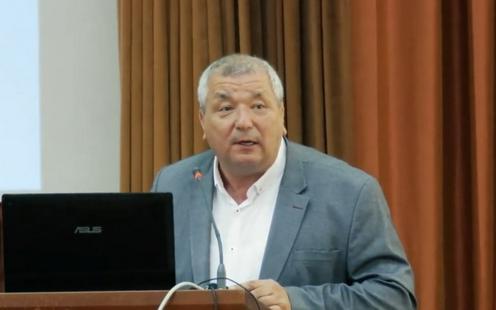The Uzbek health ministry has given no top-down directives to underreport COVID-19 cases, Director of the Institute of Virology and chief infectious diseases doctor at the Ministry of Health Erkin Musabaev has said in an interview with Gazeta.uz (in Russian), but for a number of reasons the true number of infections will always be higher than the registered cases.
“Now as before, there are no such directives,” Musabaev assured. But there is no reason to “artificially underreport” the number of cases, he said, since real and registered numbers of infections will necessarily differ, among other things due to asymptomatic patients who do not want to spend time in hospital.
“However carefully we do our job, registered infections will necessarily be some percentage lower than the true level of infection,” Musabaev said.
Another reason for underreporting may be negligence on the level of individual clinics or mistakes during testing. “If this (underreporting) is in some way going on at a local level, or due to negligence or for some other reason, then of course the statistics will be lower,” he added.
Musabaev also criticised the practice of converting hospitals into facilities to deal with COVID-19 cases. When specialist hospitals and clinics are re-equipped to house coronavirus patients, fatalities from the illnesses that these facilities were originally destined to treat necessarily rise. Such fatalities are the indirect victims of the COVID-19 pandemic.
“If we continue to admit all coronavirus patients then the next step will be to close down the Cardiology Centre, and then it will be a total disaster. How many patients will die from a heart attack rather than COVID-19? And then we will close some other clinic, a maternity hospital, things will get much worse and people will die simply while giving birth,” the infectious diseases specialist warned.
Musabaev called for a system of mobile medical treatment to be set up as soon as possible, since the healthcare system, according to him, “is already now starting to tear apart at the seams”.
Around 3,030 individuals are currently receiving treatment for COVID-19 in hospitals around Uzbekistan. The issue of whether the country should (and can) continue to hospitalise all COVID-19 patients regardless of their symptoms has been a point of discussion in recent weeks. In mid-June, President Shavkat Mirziyoyev ordered that the country should no longer hospitalise asymptomatic coronavirus patients and those with only mild forms of the disease as had been done previously. Earlier this week, it was announced that, from 5 July, cases would be divided into three categories: patients with a mild form of the infection (asymptomatic), patients with a moderate form (those displaying raised temperatures) and patients with a severe form. The first two categories will be permitted to recover at home, though their homes will be placed under the observation of the police, the National Guard and the Ministry for Mahalla and Family Affairs. Such patients will be discharged from hospital if they do not display clinical signs of the infection for a period of 10 days.
Since 23 June, daily new cases in Uzbekistan have been rising at the rate of over 200 per day and yesterday the country set a new record with 297 registered infections. Fatalities have also become more frequent over the last week, but remain at the low overall level of 28. In response, the authorities this week ordered a curfew to be introduced in the country’s red and yellow zones between the hours of 11 pm and 7 am. The rest of the time people will be allowed to gather in groups of no more than 3 people in public places. Large non-food markets and shopping centres throughout the country are also to be closed at weekends for disinfection work, and markets in Tashkent are to remain closed on Mondays. Public transport in red and yellow zones at weekends is to be reduced.
Social distancing is to be observed in public places and large stores are required to provide free plastic gloves to their customers. In yellow zones, private vehicles use is permitted only between 6 am and 10 pm, and in red zones between 7 am and 10 am and from 5 pm to 8 pm. Weddings and other ceremonies may have a maximum of 30 guests, and these must all be relatives. Hostels, nightclubs, computer games centres, discos, karaoke bars, pool halls, spas and massage parlours are to remain closed.
As of 3 July, 9,326 confirmed cases have been recorded in the country in total.










